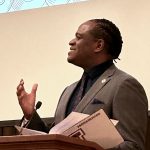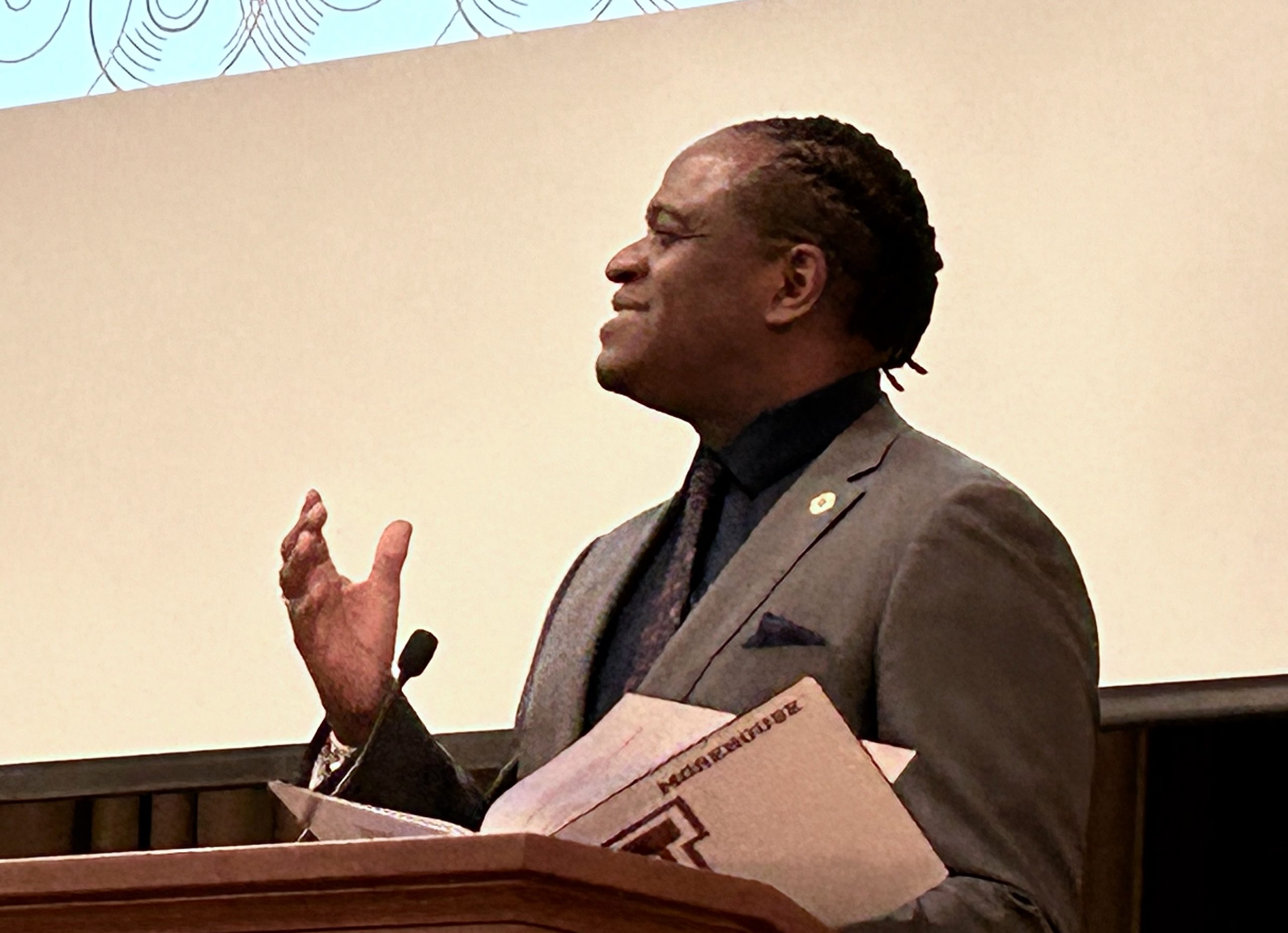King’s Feast 2024: ‘How far we’ve come, how far we need to go’9 min read
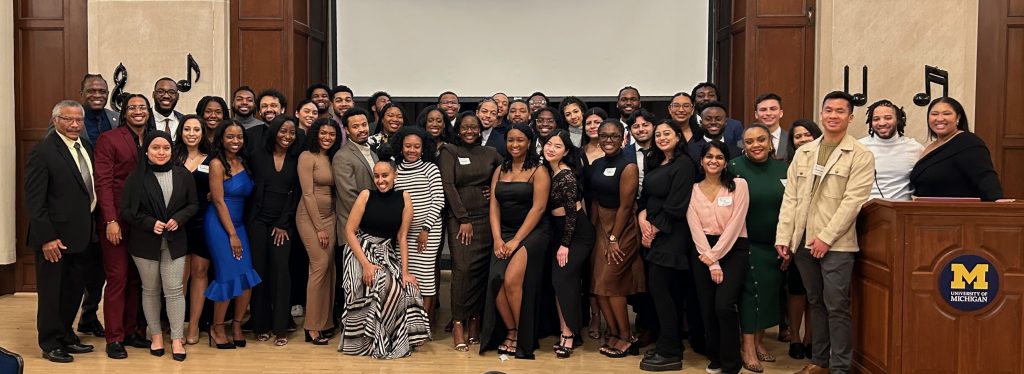
Ann Arbor, Mich., Feb. 21, 2024 – The life and message of the Rev. Dr. Martin Luther King, Jr., continues to inspire today at a time when his call to action against racism and social injustice remains as important as ever.
That message was a recurring theme among speakers at the 43rd annual King’s Feast organized by students at the University of Michigan School of Dentistry and held at the Michigan Union on Feb. 10. Like the university’s campus-wide MLK Symposium last month, King’s Feast was centered on one of MLK’s famous aspirations: “Transforming the Jangling Discords of Our Nation into a Beautiful Symphony.”
About 100 students, faculty, staff, alumni and prospective dental students participated in the dinner and program to honor the legacy of the civil rights leader. The event is organized by the school’s chapter of the Student National Dental Association (SNDA). The national organization and its university chapters promote and support the academic and social environment of historically underrepresented students in dental schools while advocating for diversity in the dentistry profession.
Delasi Denoo, a first-year dental student and co-emcee, set the tone for the evening in her opening.“Dr. Martin Luther King’s message of non-violence and civil disobedience is one that remains a guiding light in our society in our ongoing struggle for justice and social equality,” she said. “Let us not only remember his courage and resilience, but also commit ourselves to continue the work he started.”
Dr. Jacques Nör, dean of the dental school, noted its longstanding commitment to creating a diverse, inclusive and welcoming environment for students, staff, faculty and patients in every aspect of its mission. Dentists, as providers in the broader healthcare system in this country, must collaborate to improve access to care for all patients, particularly those who have historically been underserved.
Nör cited one of Dr. King’s oft-noted observations, from 1966: “Of all the forms of inequality, injustice in health is the most shocking and the most inhuman because it often results in physical death.” That injustice has not yet been conquered, Nör said, so there is much work still to do for healthcare providers and society in general. For example, a study published in the Journal of the American Medical Association last year showed that Black and Hispanic children experienced a higher risk of tooth decay than white children, with lack of access to oral healthcare a key factor explaining that disparity.
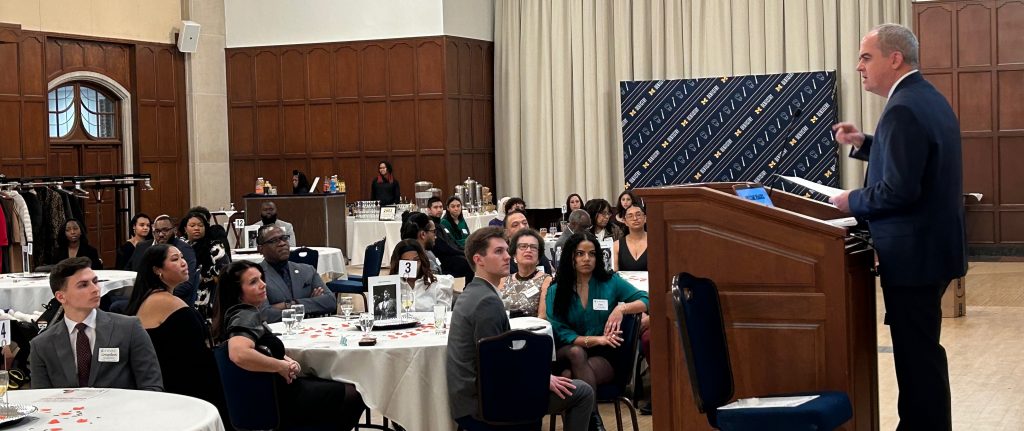
“We at the University of Michigan have a major responsibility to lead and to serve as an example of a school that ‘walks the walk’ – a school that is committed to decrease the oral disparities here in the state and to exert a positive influence throughout our country.”
Nör noted that the school has a vibrant outreach program where students are required to travel to rotations at Federally Qualified Health Centers and other clinics around Michigan. Not only do the students provide valuable dental treatment to Michigan citizens of all socioeconomic levels, but their experiences have over time translated into career choices in public health settings at a higher percentage than the national average for dental school graduates.
“So today, as we celebrate the legacy of Dr. King, I want to make a commitment to work with each one of you towards the elimination of oral health disparities in our community and our state,” Nör said. “I know that together we can be a positive influence in the lives of many kids, adults and veterans who are disproportionately affected by social determinants of oral health. Thank you for all that you have already done and thank you in advance for all that we will do together in the future to improve the health and the quality of life of our people.”
Keynote speaker Dr. Todd Ester, the dental school’s Associate Dean for Diversity, Equity and Inclusion, opened his speech with a dramatic recitation of a portion of King’s “I Have a Dream” speech that was delivered on the steps of the Lincoln Memorial on Aug. 28, 1963. The message that King delivered 60 years ago, Ester said, “resounds to this day and still challenges our nation.”
Ester said MLK has held a meaningful place in his life dating to when he was a young child looking often at a striking portrait of King that was on the wall of the bedroom he shared with his two brothers at their home in Detroit. At the bottom of the photo was the simple inscription “1929-1968.” Ester said he didn’t know what that meant until he got older and was able to understand that two years connected by a dash represent a person’s lifespan. “The dash was a representation of his life lived on earth. What a dash,” Ester said, “what a dash.”
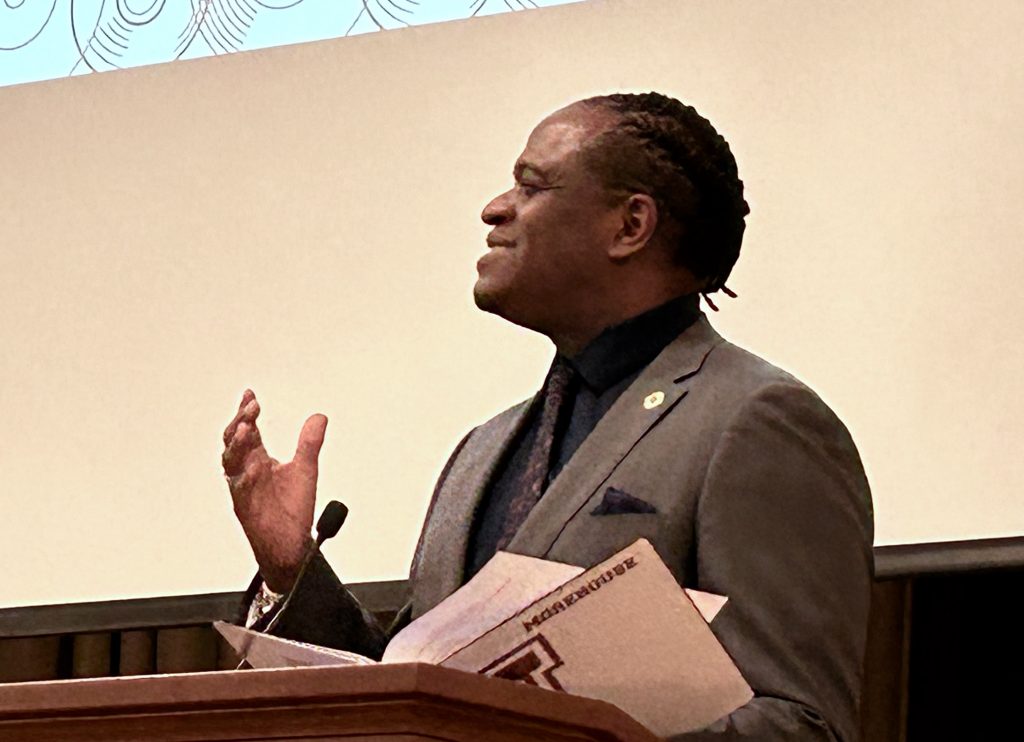
Ester said he long ago memorized King’s famous speech and carries its message with him every day as our society works toward becoming a “beloved community” that does not tolerate bigotry, racism and poverty, while embracing peaceful resolution of conflicts. Ester said he is grateful that the School of Dentistry has long provided a welcoming and inclusive environment for learning. The school, he said, is “a place where we all enter from our own unique perspectives and backgrounds, bringing our unique cultural gifts and religions, our unique habits and abilities, and we work across difference to make our community better and inclusive of all, regardless of race, sexual orientation, religion, gender, nationality or any other matter of difference of beloved community.”
“It is not owned by any one individual, it is the responsibility of us all – faculty, staff, students – to foster a system of welcoming and belonging for our fellow human beings, with compassion and caring,” he said. The school is not perfect or without challenges, he said, “but we keep working, we keep encouraging and caring, and lifting as we climb.”
Ester concluded with a challenge for current dental students, students who will be starting dental school this spring and pre-dental undergraduate students in the audience – that they never give up on their educational goal of achieving their DDS degree. The need for improving diversity in the profession of dentistry remains a priority in order to better serve the underserved populations in our country, particularly in urban areas like Detroit, Ester said. “Don’t give up when the challenge feels great, when the work seems too daunting, when the score is not high enough on the test,” he said. “We need you all in the dental profession. … Don’t give up. Be relentless. Don’t lose hope. And never stop believing in yourself and our community.”
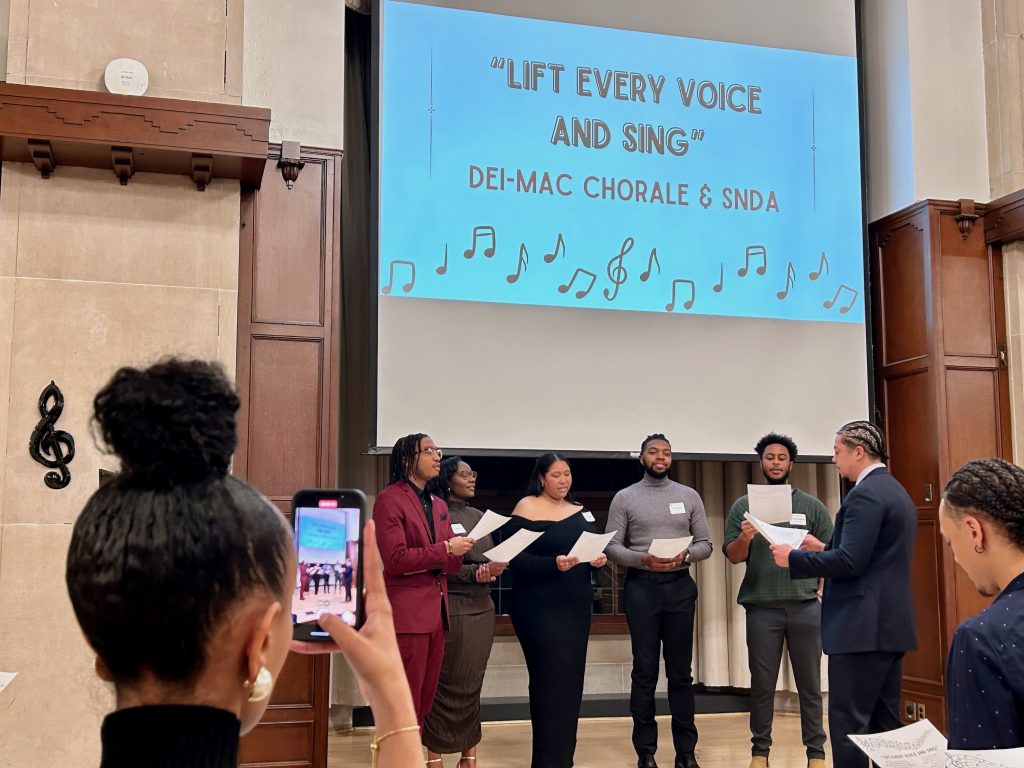
Other parts of the program included a spoken word presentation by third-year student RayJ Jackson of a poem, “We Should Make a Documentary About Spades,” by American poet Terrance Hayes; an acapella rendition of “We Shall Overcome” by third-year dental student Joi McClellan and three other vocalists from across the U-M campus, Sandra Manhan, J’Mae Ferguson and David Ntsiful; a screening of the NSDA chapter’s national award-winning video about its activities, by second-year dental student Brhan Eskinder; a piano solo of “Total Praise” by second-year dental student Gregory Crump; and a chorale leading the audience in singing “Lift Every Voice and Sing.” Outgoing SNDA president Marsha-Kay Hutchinson introduced her successor for 2024-25, Brhan Eskinder, and other new members of the SNDA board.
James Bennett, a second-year dental student and co-emcee of the evening, said King’s Feast is an important element of the academic year for the students in SNDA who organize it. The pillars of SNDA include increasing diversity within the field; providing academic, leadership and social opportunities for members; and creating a welcoming space for everyone with similar goals and aspirations.
In addition to highlighting the life and legacy of MLK, Bennett said King’s Feast is also important “to further promote diversity and inclusion within the field of dentistry for years and years and years to come.”
“It also allows an opportunity for us to look back in time and see just how far we’ve come and also how far we need to go,” Bennett said. “By allowing us to reflect and immerse ourselves in this creative environment, it really helps make us more well-rounded clinicians, students and also just a tighter-knit family at the end of the day.”
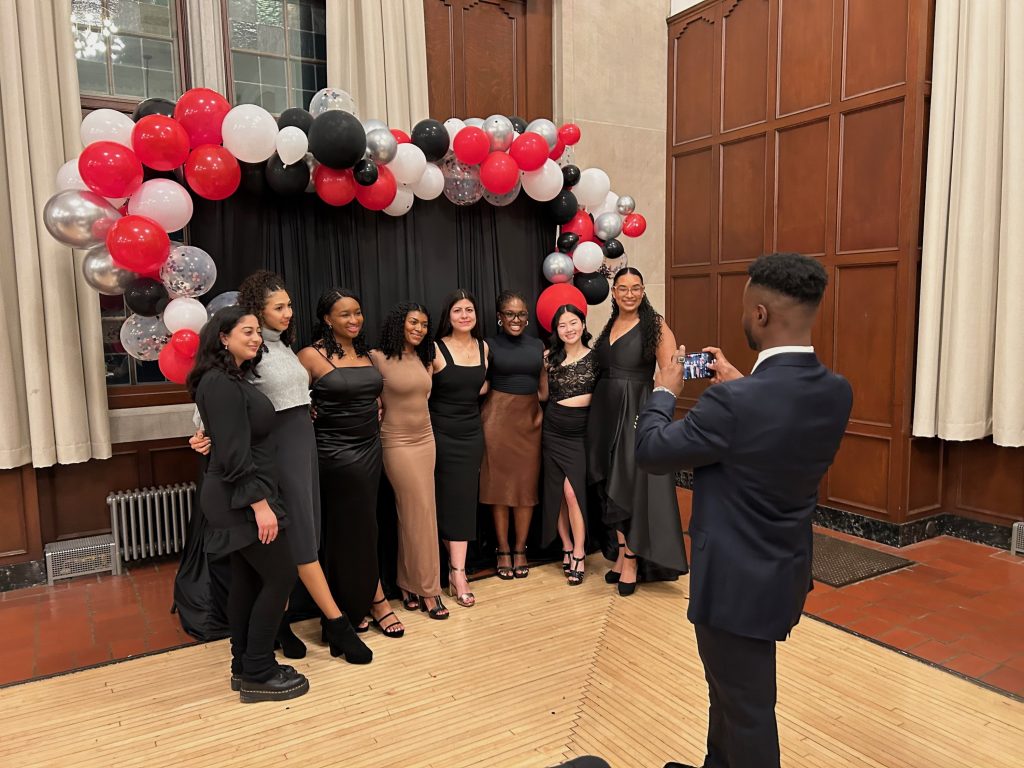
###
The University of Michigan School of Dentistry is one of the nation’s leading dental schools engaged in oral healthcare education, research, patient care and community service. General dental care clinics and specialty clinics providing advanced treatment enable the school to offer dental services and programs to patients throughout Michigan. Classroom and clinic instruction prepare future dentists, dental specialists and dental hygienists for practice in private offices, hospitals, academia and public agencies. Research seeks to discover and apply new knowledge that can help patients worldwide. For more information about the School of Dentistry, visit us on the Web at: www.dent.umich.edu. Contact: Lynn Monson, associate director of communications, at [email protected], or (734) 615-1971.

